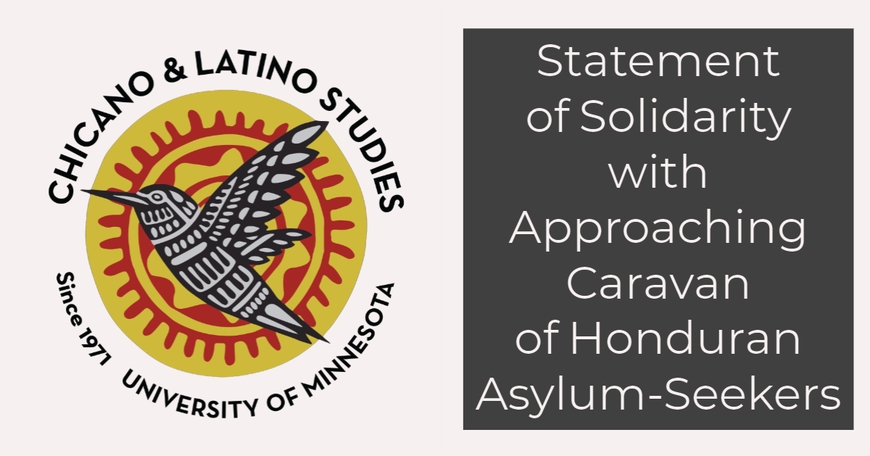Statement of Solidarity with Approaching Caravan of Honduran Asylum-Seekers
November 4, 2018
The Department of Chicano and Latino Studies at the University of Minnesota stands in solidarity with the refugee caravans approaching the U.S.-Mexico border from Honduras. We denounce the terrifying violence that these asylum-seekers have encountered along the Guatemala-Mexico border at the hands of the Guatemalan police and the Mexican federal police force and ask that immigration authorities in Guatemala, Mexico, and the United States treat Honduran refugees with respect and dignity. Both the BBC and CBS News have reported that Honduran migrants were met with tear gas and rubber bullets at the Guatemala-Mexico crossing; more than 100 migrants have been wounded and 26-year-old Henry Diaz died from injuries he sustained at the Tecun Uman demarcation of the Guatemalan-Mexico border on October 29th.
The footage of refugees trying to cross the Suchiate River with children in their arms while Mexican police helicopters circle overhead is heart-wrenching; these images invoke a moral obligation to address these governments with a call that refugees are not further traumatized or exposed to violence on their long trek north. We acknowledge that asylum-seekers from Honduras are fleeing conditions of heightened violence and an economic depression fueled by a centuries-long relationship between their country and the United States. We understand that the journey that Central American migrants must pursue through Mexico is among the most perilous and dangerous migration routes in the world due to the role of international criminal organizations which target migrants for kidnapping, extortion, robbery, and torture. As scholars with expertise on the conditions fueling Latin American migration and as members of the Latina/o/x community in the United States, we call for the end of human rights abuses against Central American migrants.
According to Al-Jazeera, Honduras has one of the ten highest per capita homicide rates in the world and more than two-thirds of Hondurans live in poverty. These conditions were largely provoked by the economic interdependence between Honduras and the United States, U.S. intervention in the Central American civil wars, and the decisions of several presidential administrations to deport members of Central American gangs, created in the United States, back to their countries.
The Honduran economy has been interdependent with the U.S. economy since the 1890s when American-owned banana plantations took root in Honduras. By 1914, U.S. interests owned almost 1 million acres of Honduran land. The United States commenced a long history of military interventions in Honduras to protect U.S. interests in the early twentieth century. In the 1980s, the Reagan Administration stationed hundreds of soldiers and trained Nicaraguan ‘contra’ forces in Honduras to overthrow the Sandinista government and to challenge leftist movements in the region. With support from the ruling class, this decade increased the militarization of Honduran society, characterized by U.S. military aid and arms sales, and the installation of American military bases. Repression and human rights abuses rose in Honduras as a result of (and subsequent resistance to) militarization.
The Reagan Administration also influenced shifting the Honduran economy to an export economy, consequentially deregulating and destabilizing the global coffee trade, upon which Honduras heavily depended. A trend of deregulation, culminating into the more recent Central American Free Trade Agreement, destabilized the vulnerable agricultural sector, and set the stage for urban emigration and international migration. During the Obama Administration, the United States also refused to acknowledge the coup targeting progressive President Miguel Zelaya. Former Secretary of State Hillary Clinton supported the undemocratic election of the post-coup government, which has partially created the recent turmoil.
Today, with unemployment rates and violence both surging, Hondurans are struggling to pick up the pieces by fleeing poverty and threats to their lives. Many migrants cite the desire for safety, stability for their children, and employment as their motivation to seek asylum in Mexico and the United States. We are privy to the fact that the U.S. government has begun to deploy over 5,000 troops and military equipment to meet the Honduran migrant caravans at the U.S.-Mexico border and to the President’s plans to place asylum-seekers in tent cities. This administration’s planned response to the migrant caravans echoes the xenophobic sentiment of a ‘zero tolerance’ approach, which was responsible for the separation of thousands of families along the U.S.-Mexico border over the summer and, most recently, has motivated announcements to end birthright citizenship.
We fear that the Trump Administration’s planned responses to the approaching caravans will further traumatize refugees who are fleeing similar conditions of military surveillance and destitute living conditions in their home countries. We remind American society and U.S. government authorities that seeking asylum is a legal act protected by international law. We reiterate our call for the Guatemalan, Mexican, and United States governments to respect the human rights and dignity of Honduran asylum-seekers and express our solidarity with the refugee caravans making their journey north.
In Solidarity,
Dr. Karen Mary Davalos
Dr. Jimmy Patiño
Dr. Eden Torres
Dr. Gabriela Spears-Rico
Dr. Jessica Lopez-Lyman
Dr. M. Bianet Castellanos


